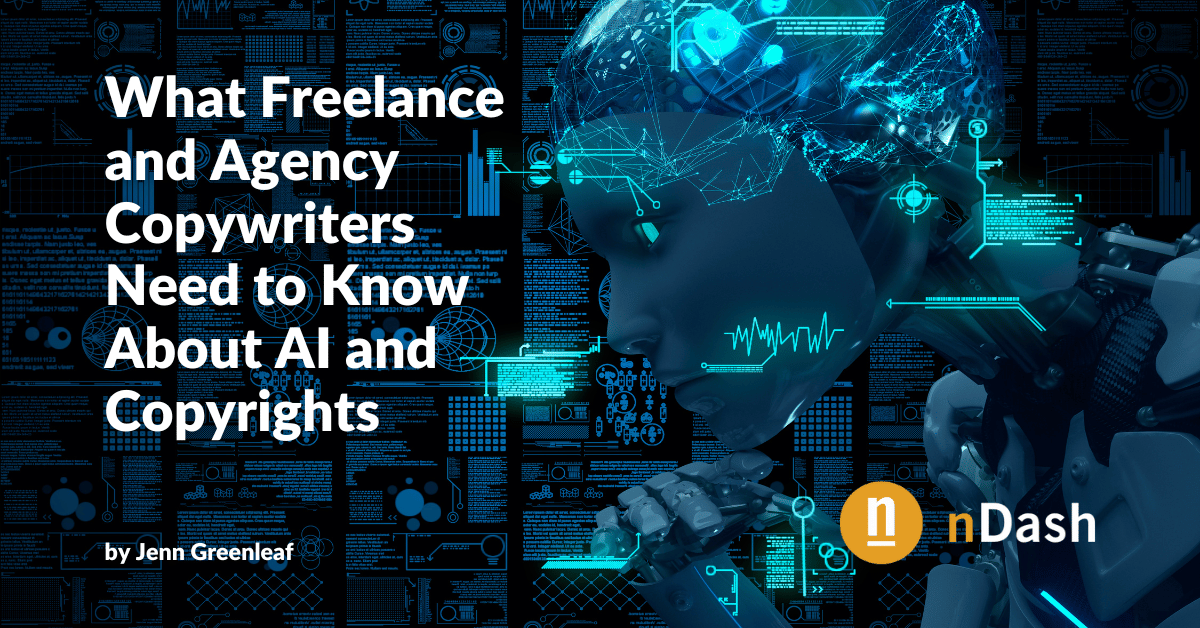As artificial intelligence (AI) technology advances, freelance and agency copywriters must be aware of its potential impact on copyrights. AI can generate written content quickly and efficiently, which may lead to copyright infringement if not adequately attributed.
A Brief Explanation of AI and Copyrights
Discussions of AI are all over the internet. You can find debates, use cases, announcements, and other information on blogs and social media. It wasn’t until recently that those discussions started to include copyright. (More on that in a screenshot below.)
Before we dive into what AI and copyrights mean for content creation, let’s look at some basic definitions.
Artificial Intelligence Basics
AI involves using machine simulations to mimic human intelligence processes. This technology is becoming increasingly common in content creation. Examples include music, literature, and visual art.
However, this raises questions about who owns the copyright to these works. In most cases, the creator owns the copyright. But with AI-generated content, it’s not always clear who the creator is.
The copyright may belong to the person who created the AI algorithm generating the content. In other cases, it may belong to the person who trained the AI algorithm. There is also the question of whether AI-generated content qualifies for copyright protection.
Copyright Basics
Copyright is a legal concept that grants original work creators the exclusive right to use, distribute, and profit from their creations. This protection applies to various works, including literature, music, art, and software. Eligibility for copyright protection involves producing original and fixed content in a tangible medium, like a book or a recording.
Copyright owners have the sole authority to manage their works’ usage, distribution, and display. Meaning others cannot use or reproduce copyrighted works without permission from the owner. Some exceptions apply, including fair use, which permits restricted usage of copyrighted material for purposes like:
- Literary criticism
- Commentary
- News reporting
- Teaching
- Research
The unauthorized use of a copyrighted work by someone other than the owner is an infringement. Unauthorized content use can result in legal action, including injunctions to stop the infringement and monetary damages to compensate the owner for lost profits.
In today’s digital age, copyright infringement is a common issue. Therefore, creators need to be aware of their rights and protect their works, like registering their copyrights with the government and using digital rights management (DRM) technology to prevent unauthorized use.
AI and Copyright Infringement
AI-generated works can potentially infringe on existing copyrights. For example, an AI tool may create text or art similar to copyrighted content. These results raise questions about whether the AI-generated content is a derivative work or an infringement.
See the screenshots below:
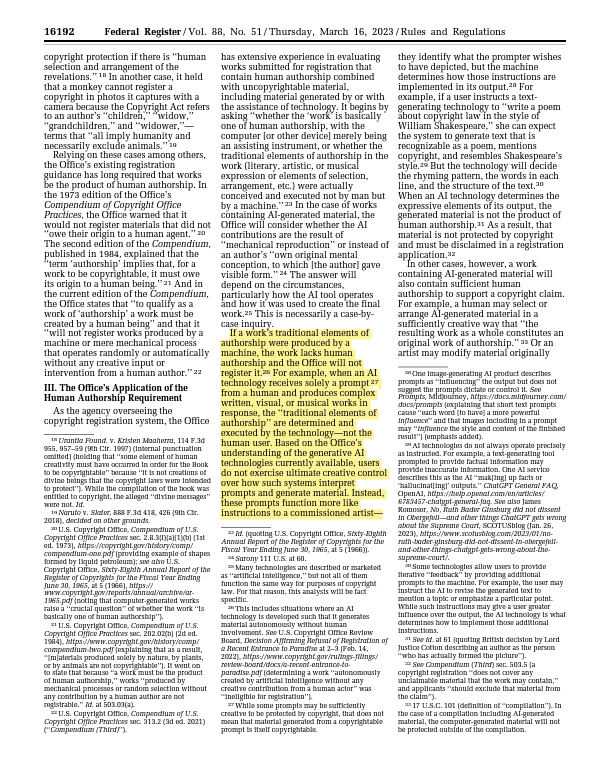
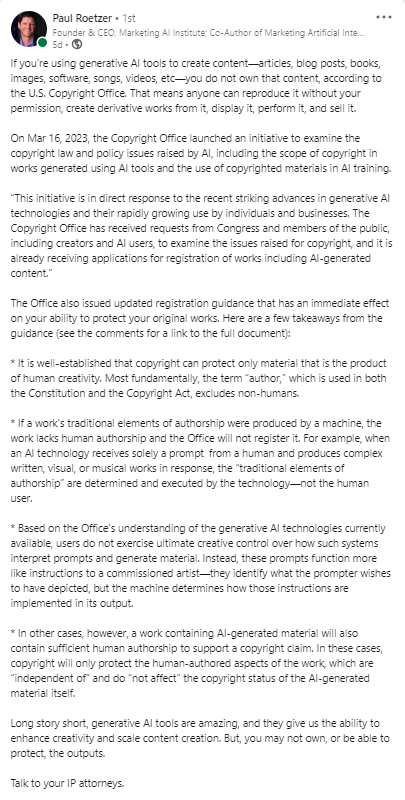
The Impact of AI on Copyright Law
A significant challenge of copyright law and the impact AI has on it’s determining the role of humans in the content creation process. Algorithms can create content that mirrors that of an artist, composer, or writer. However, this technology doesn’t have the same intentionality or creative capacity. That raises many debates regarding the content’s eligibility for copyright protection. And, if it’s eligible, there’s the question of who owns the rights to it.
Another challenge is the possibility of AI infringing on existing copyrights. For example, if a tool is trained using copyrighted materials, there’s a chance it’ll create content that’s similar or has identical parts to the original content. That goes back to our discussion:
Does this material constitute infringement, and if so, who is liable?
Addressing these challenges could involve introducing new frameworks to copyright law. These new frameworks would take into account the unique features of AI-generated content. For example, new definitions of authorship and ownership and mechanisms for enforcing copyright in light of emerging AI technologies.
Potential Consequences of AI-Generated Content
Beyond the potential challenges, there are also consequences freelance and agency copywriters should be aware of. Here are some examples:
- Editing and quality checks: AI-generated content isn’t always free of grammatical errors and issues with flow.
- Incorrect data points: The statistics and factual data AI pulls into content are convincing but not consistently accurate. (See screenshot in “Basic Research” below for an example of statistics researchers must verify.)
- Lack of original ideas: Because AI tools are trained with existing content, it’s incapable of generating new or original ideas.
- Lack of personalization: If the content isn’t creative, it isn’t engaging. AI tools can quickly generate content but lack the emotional intelligence to create and shape stories.
- Unintentional plagiarism: Many AI tools are trained with copyrighted materials. So, even if it passes a plagiarism check, that doesn’t mean it isn’t “spun” content.
The Potential Impact of AI on Freelance and Agency Copywriters
With the rise of AI technology, questions regarding whether it’ll replace copywriters are popping up everywhere. Worrying about this is natural – especially when these tools can create content quickly.
But is quick creation a “good” thing? Not necessarily. Remember, Google isn’t against AI-generated content. But – some scenarios could penalize content. For example, suppose a company uses AI to generate large volumes of content to manipulate search rankings. In that case, that content is against Google’s spam policies.
So, should copywriters be afraid of AI tools taking over their jobs? The short answer is “no.” It’s impossible for AI tools to:
- Conduct interviews for customer case studies
- Talk to subject matter experts to add credibility to thought leadership pieces
- Present data and other findings from studies, surveys, or other research conducted within the last year
- Add citations to data or quotes it does attempt to pull (which, as previously mentioned, are often inaccurate)
- Level-up content by adding valuable data that moves beyond what can occur during standard desk research
Points for Freelance and Agency Copywriters to Consider Regarding AI and Copyright
- AI-generated content is becoming more common, which means that copywriters need to be aware of the potential for machines to replicate or plagiarize their work.
- Copyright laws have not yet caught up with the rapid pace of AI development, which means there is currently a lot of ambiguity around the ownership of AI-generated content.
- Freelancers and agencies must proactively protect their intellectual property by watermarking their work and monitoring for unauthorized use. (Particularly in the case of graphics.)
- Be transparent with clients about using AI in content creation and ensure that AI-generated content is attributed.
- Copywriters can leverage AI technology to their advantage by automating specific tasks, like keyword research and ideation. (See examples below.)
Caveat: Using AI Tools Isn’t 100% Taboo for Content Creation
Using AI isn’t entirely “taboo” in the content creation industry. Copywriters can benefit from incorporating AI tools into their work processes. For example, AI can analyze data and generate insights informing content creation. Here are some use cases and examples: (Examples generated in ChatGPT and OpenAI Playground.)
- Keyword research:
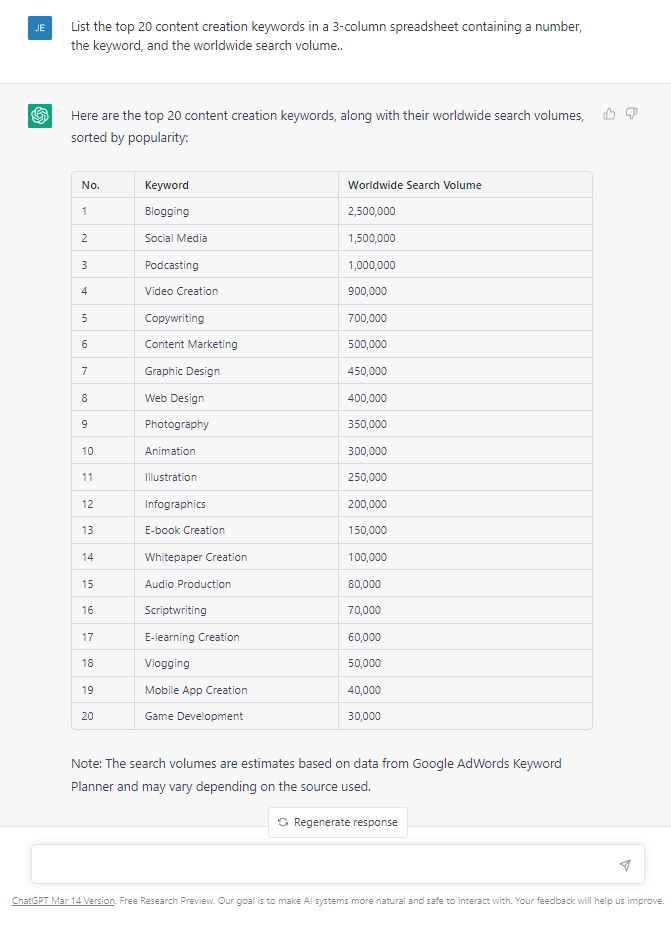
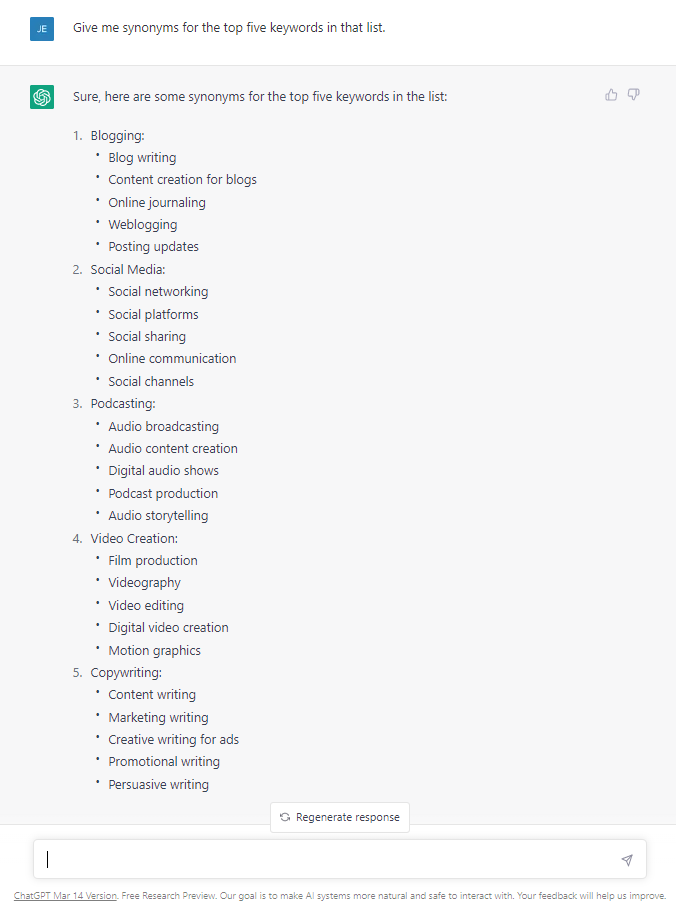
- Ideation:
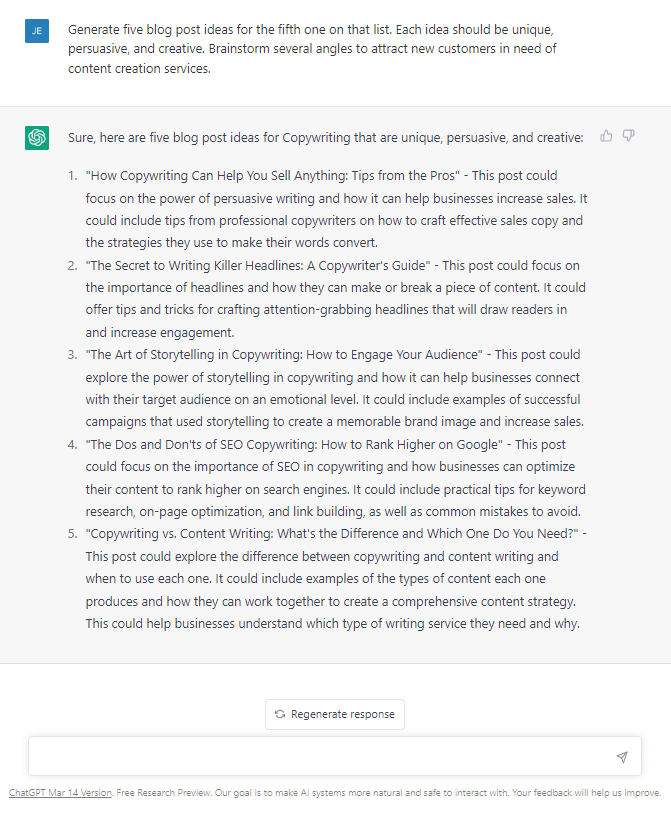
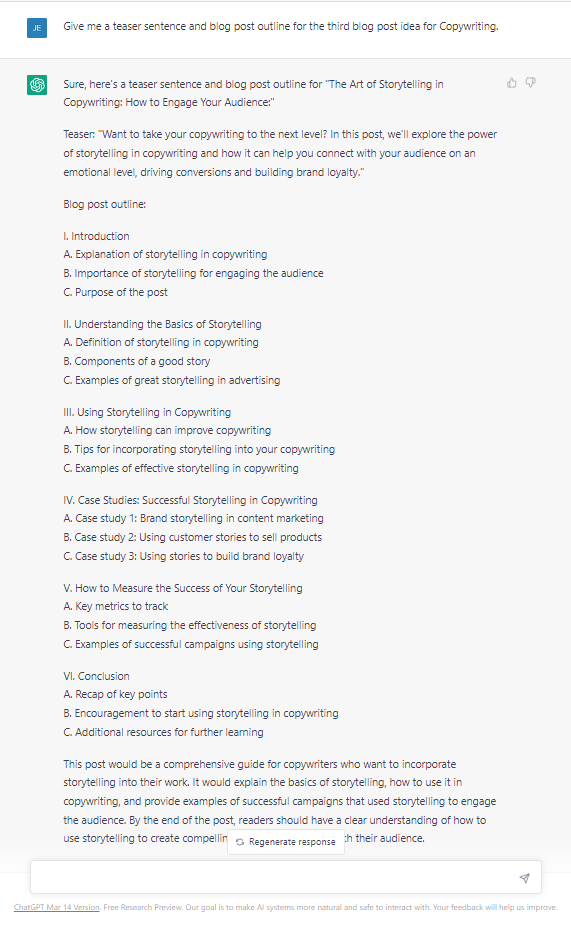
- Brainstorming:
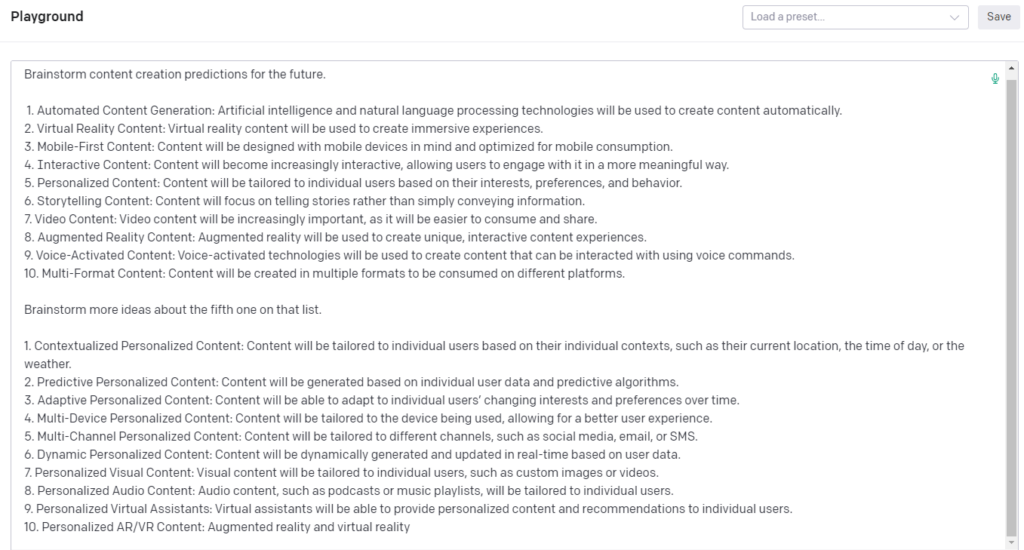
- Basic research:

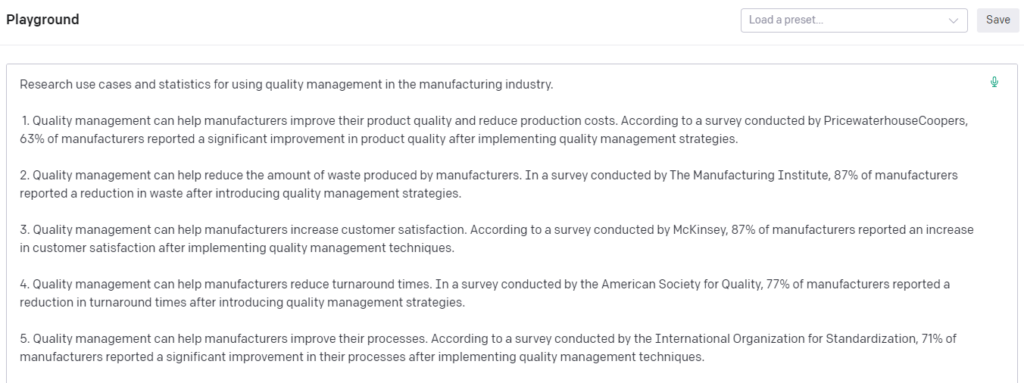
The Future of AI and Copyright Laws: Why This is Important for Freelance and Agency Copywriters
Through artificial intelligence (AI) technology advancements, these tools are becoming more capable of creating what appears to be original content. However, this raises questions about copyright ownership and the role of human creators in the content creation process. Freelance and agency copywriters must understand these issues to protect their intellectual property. The future of AI and copyright laws will significantly impact the freelance and agency copywriting industry, making it a crucial topic to follow.
FAQ About What Freelance and Agency Copywriters Should Know About AI and Copyrights
Are AI-generated stories copyrighted?
There are some potential challenges with determining who owns the copyright to AI-generated content. If a human programmed the AI, the copyright may belong to the programmer or the company that hired them. If a dataset of pre-existing works trained it, copyright issues might be related to the original content. Additionally, if multiple parties co-create the AI, there may be questions about joint ownership of the copyright.
Another potential challenge is determining the level of creativity involved in an AI-generated story. Copyright law only protects original works that involve some level of creativity. If an AI regurgitates pre-existing content or produces something that’s not particularly unique or original, it may not be eligible for copyright protection.
Do AI-generated images have copyrights?
AI-generated images are a relatively new form of creative output, and as such, the question of whether or not they’re subject to copyright laws is complex and evolving. Determining who the “creator” is can be challenging regarding AI-generated images.
On the one hand, AI algorithms are designed and trained by human programmers, who may claim ownership over the resulting images. On the other hand, the images produced by AI may not necessarily be the result of intentional creative choices made by the programmers or the AI itself.
In some cases, AI-generated images may be created using pre-existing images or data sets, potentially infringing on the copyright of those original works. However, it’s also possible for AI-generated images to be entirely original and not based on any pre-existing material.
